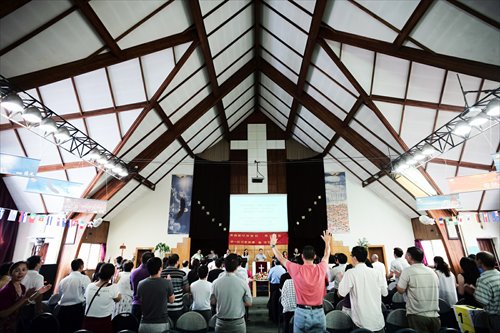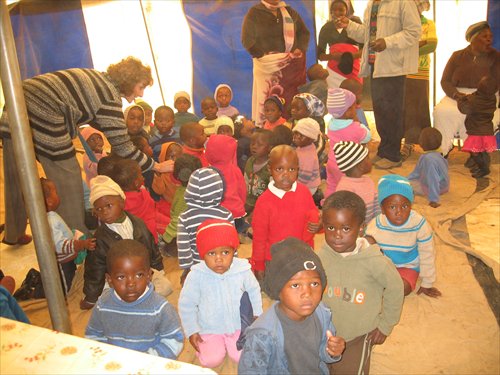Isolated in Africa, Chinese workers get religion en masse when missionaries lend a helping hand
As trade and communication between China and Africa grow, so too has the Chinese presence on the continent. But due to language barriers, safety issues and cultural differences, Chinese usually live a life of isolation. Discovering the belief vacuum, some Chinese missionaries have stepped in. They are becoming a third force beside government bodies and business tycoons providing newly arrived Chinese workers with prompt language and legal assistance, and the love and care they so sorely lack.

An opening ceremony of a theological seminary is held at the South Africa Chinese Covenant Church (SACCC) on January 24. Photo: Courtesy of SACCC
The growing Sino-African trade, boosted by state authorities and grass-roots businesses, has brought an increasing influx of Chinese people to the continent.
Though many make Africa their new home, life in the continent for the immigrants is far from comfortable. The Chinese workers face a number of problems trying to adapt to the new social and cultural environment.
At present, there are about 2,500 Chinese-funded companies and more than 1 million Chinese living in Africa. Adams Bodomo, a professor of African languages and literatures at the University of Vienna, even put the number as high as 2 million.
Due to the language barrier, cultural differences and high crime rates of local society, many Chinese in African countries live an isolated life.
In some places, tensions between Chinese and local residents have worsened. In Ghana, armed police arrested and attacked Chinese gold miners; in Zambia, labor disputes occurred between Chinese mine managers and local employees.
In South Africa, home to the largest population of Chinese migrants in Africa, with approximately 500,000 people, robberies targeting Chinese frequently happened.
To relieve the pressure, Chinese government-initiated projects have offered various after-work activities for their Chinese employees in Africa. They build enclosed compound with full facilities for the workers to live and work inside.
The Zambia-China Economic & Trade Cooperation Zone, which houses about 20 Chinese firms, regularly holds after-hours activities for workers, including ping-pong, basketball and soccer matches, singing competitions and ideological learning activities centered around the Communist Party of China.
"The Party organization frequently holds a variety of activities to enrich their lives," Zan Baosen, the zone's manager, told the Global Times.
But for many private business owners and individuals, including businessmen, farmers and immigrants, loneliness and feelings of helplessness plague them.

SACCC co-workers and members visit an orphanage in Winterton area in South Africa. Photo: Courtesy of SACCC
To gamble or to pray
The difficulty of adapting to new life in Africa is where some missionaries of Christianity have stepped in.
"I feel I am needed here. The church is like a big family in which we can offer Chinese help to the best of our ability," said Tuan Chung-yi, the pastor of South Africa Chinese Covenant Church (SACCC), located in Edenvale, Johannesburg. He calls for more Chinese missionaries to go Africa.
Tuan and his wife Hsu Mei-mei are missionaries from Taiwan. They applied for an Africa mission with Serving in Mission, an international Christian mission organization, and left for South Africa in 1991.
Several church-goers interviewed by the Global Times said that their belief gives them power and courage, and that the church offers them another home.
Many foreign nationals living in and working in South Africa have stories of theft or robbery. Chinese, who are usually hardworking and prefer making deals in cash, are frequent targets.
"There are few Chinese businessmen who haven't been robbed here. I do baseball cap wholesale trade here, and once or twice my car was followed, my goods were stolen, and my home was robbed," said Li Xiuhua, 60, who came to South Africa 16 years ago from Qingdao, in East China's Shandong Province, in a recent interview with the Global Times.
On January 26, a farm managed by a Chinese couple in southern outskirts of Johannesburg was broken into by four robbers who attacked the man, tied up the woman, stole the couple's valuables and fled. The man died later in hospital, bringing the total number of Chinese deaths in January in the country to five, according to the Xinhua News Agency.
"Due to safety concerns, overseas Chinese don't dare go out at night. They can't deeply integrate into the local community, and many feel empty inside. Some seek spiritual support in churches, some go to gambling houses," Kevin Yeh, Deacon of Johannesburg Christian Chinese Church, told the Global Times. He estimated that 5 percent of the Chinese in Johannesburg are religious believers.
Gambling houses in cities, which are open 24 hours and offer full services, including temporary care for children, are nearly the only entertainment for Chinese immigrants in South Africa, according to a video made by Amazing Vision Gospel Ministry, a non-profit organization registered in the US which produces audio and video works concerning the Christian gospel.
"On the weekends, nearly all the faces in the gambling houses are Chinese," said the video filmed in 2010. "A Chinese [gambler] was killed in broad daylight for owing money."
That's why missionaries like Tuan are convinced that their work is significant.
Practical benefits
Tuan, 61, says that his work goes beyond the church, with frequent visits to hospitals and police stations.
"Apart from spreading the good news to Chinese immigrants and organizing gatherings, I also help them deal with problems and paperwork in police stations, jails and hospitals," he said, noting that some Chinese are not good at English and don't understand South African legal procedures.
Tuan and Hsu go to stores and restaurants run by Chinese immigrants. When they hear about fellow Chinese injured in attacks by criminals, Tuan and his wife pay the victim a visit in the hospital.
In addition to opening English classes for Chinese businessmen, they also organize classes for their children to study Chinese and provide free Chinese-style lunch.
Tuan uses a Chinese proverb that at home one relies on his parents and outside on his friends to describe their job, a philosophy that his flock say he and Hsu embody.
"Within the church, we are no longer homeless 'orphans' but have sisters and brothers. We feel fearless and happy," said Li Xiuhua, a Christian and a member of Tuan's church.
Wearing clergy robes, Tuan also regularly goes to the city's international airport to welcome Chinese arrivals.
"I don't pester them. I just express simple greetings and introduce myself before I give them a gospel poster and my contacts. I tell them they can reach out in case of any problems," Tuan said.
Though most Chinese from the mainland are not particularly religious, he said he hasn't been outright rejected by anyone. "I've been here [in South Africa] for so long, most people know me or have heard of me."
Many people choose to convert to a religion, as they are strained by the turbulent life and faced by a new life environment on the strange continent.
Xu Yingchun, 42, lives with her husband and two children in Johannesburg. She quit her job as an airline stewardess in Dalian, Liaoning Province and came to South Africa in 2001 to reunite with her husband who runs diamond business. Like many others, she struggled with loneliness and insecurity until her husband took her to a church.
More thirsty souls
When he first arrived, Tuan intended to proselytize Indians in South Africa. But beginning in the mid-1990s, he and Hsu gradually shifted their outreach to Chinese arriving in the country. Since Nelson Mandela assumed the presidency in 1994 and established diplomatic ties with China in 1998, more and more people from the Chinese mainland have arrived in the country.
In 2005, with funds raised from devotees, the mission society Tuan belongs to purchased a chapel. The church, which can hold up to 300 people, is supposedly the largest church for Chinese in South Africa.
According to Tuan, the church now has around 80 regular churchgoers. More than 60 are from the Chinese mainland, and most are restaurant runners or businessmen.
Tuan's wife Hsu Mei-mei, who became disabled after contracting polio in childhood, assists Tuan with his work. From serving tea to churchgoers and visiting the homes of those in need to administrative work, she shoulders a significant burden of her own.
The couple also left their mark in several other African countries on short-term missions, establishing churches, gospel fellowships and starting Bible study classes. The poor people and orphans are also their supporting targets.
Many from their church have joined their cause. Xu Yingchun, besides taking her children to the SACCC church every weekend, also volunteers to help out in the church, teaching students Chinese and leading children on visits to local orphanages.
According to Tuan, there are at most 40 Chinese missionaries in Africa, mainly from Taiwan, Hong Kong, the US and Singapore. "As far as I know, there isn't any full-time missionary from the Chinese mainland yet," he said.
Recently, the Global Enrichment Theological Seminary, established in 2002 in the US to provide Chinese theological education, opened its ninth campus in South Africa. On January 24, the opening ceremony was held at the SACCC.
"Around 40 students have signed up for the two-week intensive education program. I hope some of them can become full-time missionaries after graduation," Tuan said, adding that during his field missions he's seen a strong desire among Chinese in other countries for missionaries who can help build churches.
Religious beliefs are seen by some as a way to break down the cultural barriers. A Buddhist temple, opened in the small town of Bronkhorstspruit in 2005, has become the largest Buddha temple in Africa, attracting thousands of Chinese pilgrims each Chinese Lunar new year.
Tuan believes the Chinese presence will increase in African countries and that more missionaries are needed. During a five-nation tour in Africa in January, Chinese Foreign Minister Wang Yi stressed that China aims to double Sino-African trade to $400 billion by 2020.
Newspaper headline: African adaptation